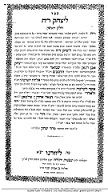A Short Tribute
Hacham Yitzhak Even Denan, son of Hacham Samuel, was born on 15 Av, 5594 (1834) in Fes, Morocco.
Hacham Yitzhak Even Denan learned Torah from his father, Hacham Samuel of the Even Denan dynasty, which traces its ancestry to Maimonides. When his brother, Hacham Moshe Even Denan, died (1858), his son, Hacham Moshe Even Denan also began to study with his grandfather, Hacham Samuel, so that Hacham Yitzhak Even Denan studied together with his nephew, Hacham Shlomo Even Denan.
In 1875, Hacham Yitzhak Even Denan visited the Land of Israel with his nephew, Hacham Shlomo Even Denan.
In 1879, Hacham Yitzhak Even Denan was appointed Dayan in Fes.
Hacham Yitzhak Even Denan married and three of the couple’s children grew up to be Torah scholars: Hacham Maimon served as the Fes community treasurer, Hacham Samuel was a preacher, and Hacham Jacob was a shochet and a religious manuscript scribe.
Hacham Yitzhak Even Denan passed away on 24 Iyar, 5660 (1900) and was buried in Fes. His writings, published by his sons in a book entitled L’Yitzhak Re’akh, include responsa, textual commentary, and halakhic rulings.
A few quotes from the Rabbi on 'Customs of Israel' in which he provides the reason for the custom to refrain from eating black olives during the month of Nissan
I was asked what I thought and how I feel about the prevalent custom in our city’s community to refrain from eating black olives during the entire month of Nissan. My custom is also not to eat them, and may I say that the customs of the people Israel are considered as Torah.
Being that it was during this month that the Almighty took us out of slavery in Egypt, and that we were commanded to “Remember this day when you left Egypt”, and that our sages, of blessed memory said [concerning olives], “the father [the source, i.e. the olive] causes memory loss and its outcome [oil] clarifies [thought], they had the custom of refraining from eating olives, their reason being that eating them causes forgetfulness. We are commanded to remember the miracles performed for us during this month. In order to cherish the commandment in a timely way, on the date and time that the miracles happened, it is not right that we eat something that causes forgetfulness.
The reason for singling out black olives is because oil is usually drawn from them. They said that "the source causes forgetfulness" concerning the olive whose son [outcome] clarifies, and the ones that are common during this season are generally the black ones; the green ones are less common. Their ruling concerns the ones that are common, so they did not rule concerning the less common ones.
L'Yitzhak Re'akh, Volume II, p.5a, Bnei Issachar Institute Press, Jerusalem, 1986
